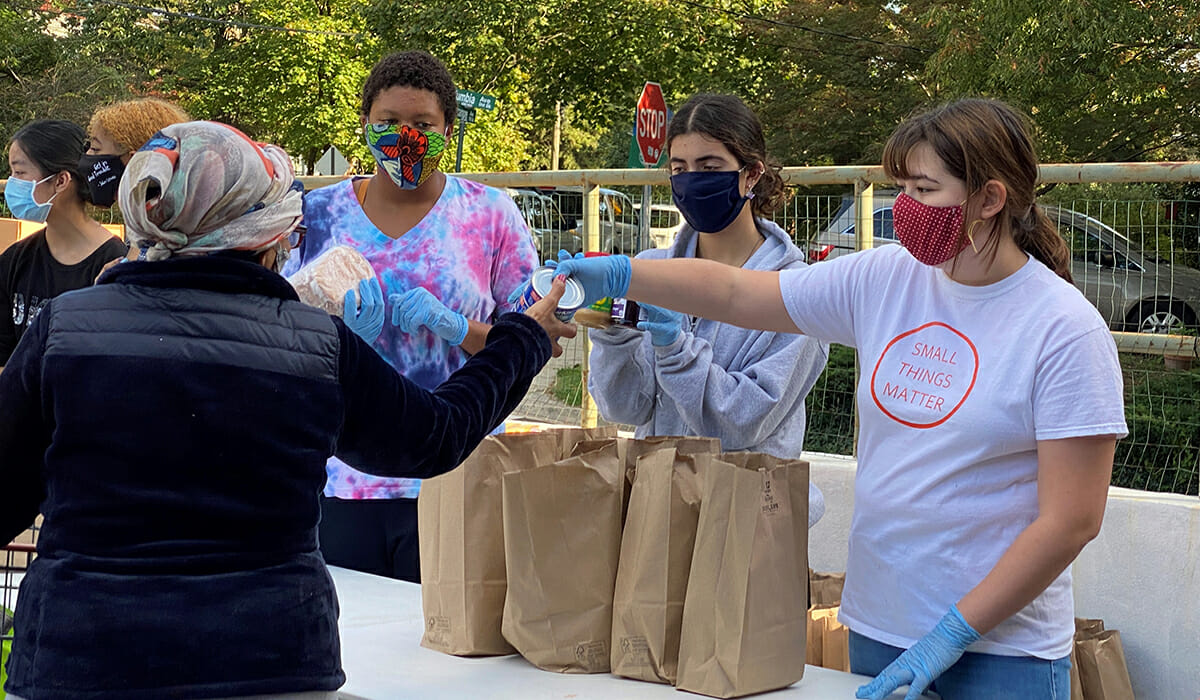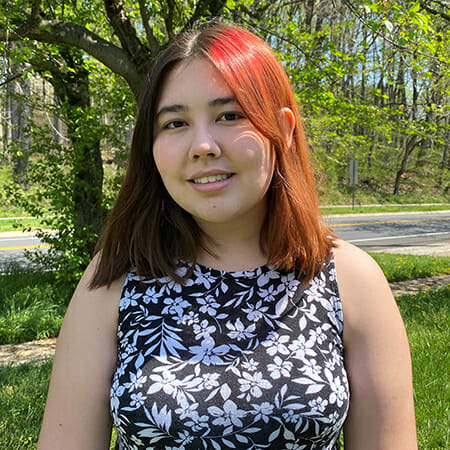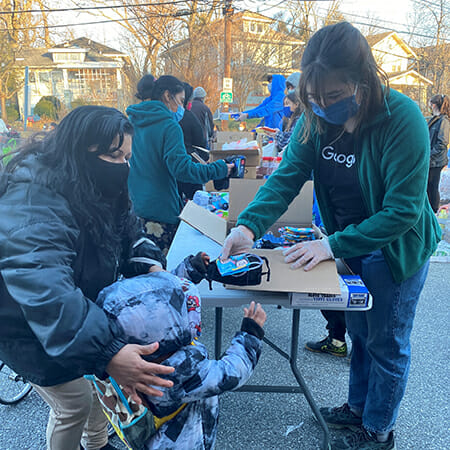Teen Brings Young People Together to Commit Acts of Kindness in Maryland Community

Meet Daily Point of Light Award honoree Lana Anderson. Read her story and nominate an outstanding volunteer or family as a Point of Light.
Lana Anderson has spent almost her entire life volunteering, starting with serving the Thoughtful Treasures program at the National Institute of Heath where her parents work when she was just four years old. In the over a decade since the spirit of service was first instilled in her, Lana has started her own nonprofit to promote volunteerism in her fellow youth.
Small Things Matter, which Lana started in 2017, focuses on encouraging youth volunteers in her Rockville, Md. community to help others through acts of kindness. The 16-year-old leads 20 to 30 teenaged volunteers in running a literacy program that reads to children at community events and distributes books; a charity crafting program that brings together children to make handcrafted items for various causes, including making cloth masks during the pandemic; and a food distribution program that currently serves over 1,000 families.

Describe your volunteer role with Small Things Matter.
Small Things Matter at it’s core is a youth-focused nonprofit, so a lot of the work we do serves youth and we also try to involve people of all ages, from very small children up through adults, in doing this service for others. I am the founder of Small Things Matter. We have three different programs. Firstly, we have our Books for Bedtime program which is a focus on literacy. Pre-pandemic, we did a lot of reading to children at various community events like PTA meetings, and then also distributing books at food distributions and Title I elementary schools. Right now, we’re running an online reading program and doing low-contact distributions. I coordinate that and run the literacy program. Program number two is our Crafting for Charity. Our crafting program is mostly run by teens and then we involve younger children in making handcrafted items for various causes. We’ve done things like making mugs with notes for seniors and baking goods for the homeless. We also do a lot of stuff for children’s hospitals. It’s very, very kid-focused in that it’s teenagers running this program that involves kids doing service that benefits the other children. I lead this as well. Finally we have our biggest program, food distribution, which really blew up over the past year. It’s called Kokua Foods. Kokua is a Hawaiian word. It means to give selflessly and that’s what the program is about, sharing with other people. That’s a big distribution of produce and dairy products. We’ve expanded to nonperishable goods and even pre-made meals. Right now we’re doing over 1,000 families. Some of them we serve twice a month, some of them are up to twice a week.
What inspired you to start this?
My parents work at the NIH [National Institutes of Health] and at the NIH, there’s a program called Thoughtful Treasures. It’s for the Children’s Inn, which houses kids with rare diseases who are being studied or they’re in clinical trials and things like that. It’s a specialized hospital. Everyday those kids get an item, something small — a toy, a kind note, or something to cheer them up and make them feel more at home since they’re from all over the world. Since my parents worked at the NIH which is where this program is, I was involved in making items and donating them from a really young age, like four or five. As much as I liked having the art and other silly things I made, I really enjoyed being able to give them to someone else and have fun making someone else feel better. I continued with that for awhile, and then got involved with service once I hit middle school. It was nice to serve and volunteer with other kids my age. I think it’s really valuable for children of all ages to be involved in service and to really promote that. That inspired me to start [Small Things Matter.]
Why is it important for your community to have access to your literacy and charity crafts programs?
I think education is really important, and literacy and learning how to read and learning information is very important. I think education is really useful later in life for getting jobs, but it’s also very enjoyable and fun. It’s a good habit to get into from a young age, especially for our lower income families. Books are remarkably expensive and it can be difficult to get into it if your family doesn’t have enough resources, so we want to share those opportunities and encourage reading. For our crafting program, helping other people is a good habit to get into. It’s a nice thing to do. I think lots of different cultures and religions prioritize helping people and it’s universally agreed upon that it’s a good and important thing to do.
Do you have any goals you would like to see Small Things Matter achieve?
It sounds odd, but our goal is to keep serving the people who we’ve been helping right now and stop the expansion of our program, because that would mean more people need help. Ideally, in a perfect world, no one would need assistance at all. They would just be fine on their own.

What’s been the most rewarding part of your work?
There are definitely lots of tiny experiences that have been very meaningful. Children being super excited to pick out a book and grinning at the chance to have something to read and take home. People showing up in masks to our crafting events and being excited to give back. Especially with our food distribution, the community response has been really heartwarming. There is a lot of need but there’s also a lot of support, both from individual volunteers and other groups and businesses. It’s nice to see everybody come together to try to help.
What have you learned through your experiences as a volunteer?
I learned a lot of practical knowledge about hunger and things like that with our food distribution, which was kind of shocking but very interesting and good to know. … [I learned] a lot about the breadth of hunger. People think of America as a very developed country but there’s still a lot of people who are barely scraping by. Even things like SNAP benefits or other governmental assistance aren’t necessarily enough to actually support your family, which is why our food distribution and other groups that serve this need exist. There is still a need and it’s very unfortunate. We’re trying to do as much to help as we can, but there’s a lot of need.
What do you want people to learn from your story?
The name of Small Things Matter is important. I think that tiny gestures can be very meaningful. Even if you help someone a little bit and you think your contribution might not be important, it really is. It really snowballs. I would encourage everyone to try to give back where they can. It does really add up.
Do you want to make a difference in your community like Lana? Find local volunteer opportunities.